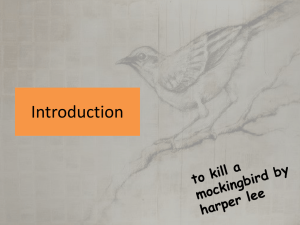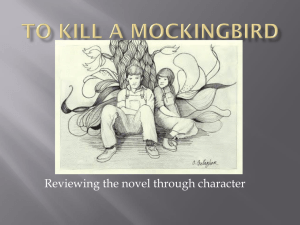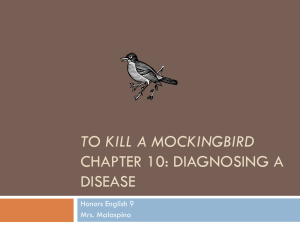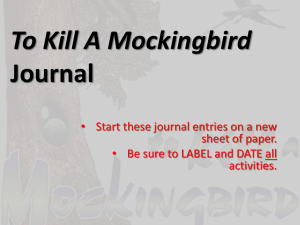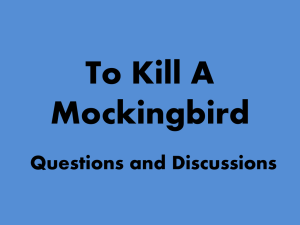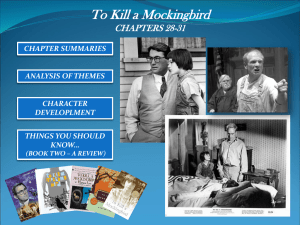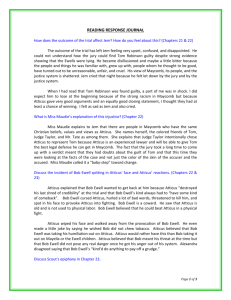ToKillAMockingbirdpowerpoint
advertisement
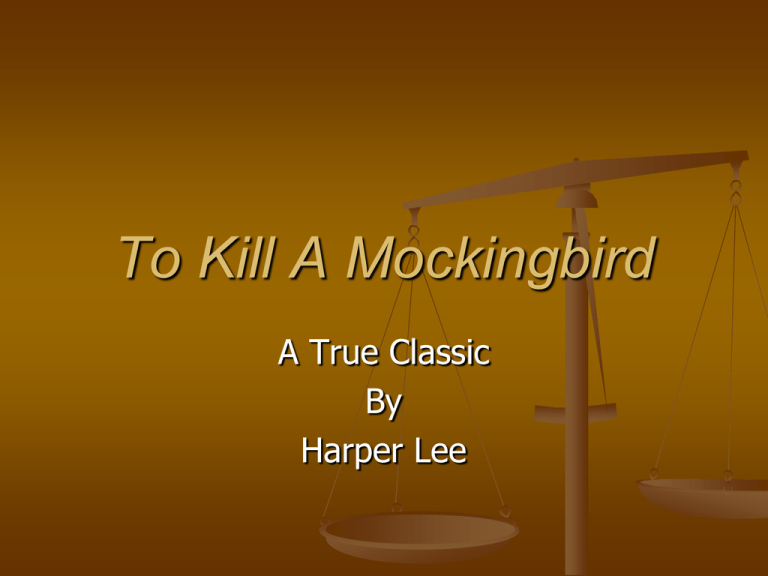
To Kill A Mockingbird A True Classic By Harper Lee Harper Lee and Her Novel Family of Harper Lee Born: April 28, 1926 in Monroeville, Alabama…real name Nelle Harper Lee Parents: Amasa (father) Frances Cunningham Finch (mother) Father: lawyer and served in the Alabama Legislature Siblings of Harper Lee Youngest of four children Sister: Alice was a lawyer and practiced with her father Sister: Louise married Hank Conner and had two children Brother: Edwin Coleman married Sara Anne McCall and had two children Education of Harper Lee Youngest of four children…educated at Monroeville public schools Attended Huntingdon College 1944-45 Studied law at the University of Alabama 1945-49 Studied one year at Oxford University Employment of Harper Lee Worked as a reservation clerk with Eastern Air Lines and British Overseas Airline Company in 1950’s Gave up job to focus on her writing Divided her time between NYC and Monroeville Friends Growing Up Growing up loved to write Truman Capote was her neighbor Born Sept. 30, 1924 Died Aug. 25, 1984 Wrote Breakfast at Tiffany’s (1955) and In Cold Blood (1966) Spent summers in Monroeville Writing the Novel Compiled the story Submitted it for publishing to J.B. Lippincott Company Urged to rewrite because too much like a group of short stories rather than a novel Worked with an editor for two and a half years to rewrite Resubmitted in 1960 The Novel’s Reception Published July 1960 Placed on best seller list for 85 weeks straight Printed in ten languages Became book of the month Became a Reader’s Digest condensed book Paperback of the year in 1962 Won the Pulitzer Prize To the Big Screen Made into a movie Gregory Peck won the Academy Award for his role as Atticus Finch Mary Badham Wilt played Scout Nominated for Best Supporting Actress at age ten, but lost to Patty Duke Movie Cast Dill: John Menga Miss Maudie: Rosemary Murphy Mrs. Dubose: Ruth White Tom Robinson: Brock Peters Calpurnia: Estelle Evans Mayella: Colin Wilcox Paxton Bob Ewell: James Anderson Aunt Stephanie: Alice Ghostley Boo: Robert Duvall Nathan: Richard Hale Jem: Philip Alford Novel’s Background The novel is based on the following: National events Specific people Personal experience National Events Scottsboro Trial Alleged gang rape of two white girls Nine black teenagers accused Southern freight train from Chattanooga to Memphis March 25, 1931 April 9, 1931…nine were sentenced to death Mistrial for the ninth because of his youth Executions suspended because of appeals November 7, 1932 US Supreme Court ordered new trials because they had not had adequate legal representation Maycomb is Like Monroeville Truman Capote was Dill Atticus was based on Harper’s dad Calpurnia was similar to Hattie Belle Clausell the negro woman who helped Harper Lee’s mom The Radley family was similar to the Boleware family who lived on the same street at Harper’s family…their son got into trouble with the law and was kept inside under the father’s watch… very similar to Boo Stores in the book are like those in Monroeville…the courthouse was at the center of the town square in both places Monroeville Today Monroeville, the county seat of Monroe County, was named, like the county, for U. S. President James Monroe. The land was originally held by Creek Indians. Total size of the county is 1,019 square miles, the ninth largest of-Alabama's counties. In and Around Monroeville Today Concepts from the Novel Legal Aspects Prosecution: The state of Alabama (Mr. Gilmer) Defense: Tom Robinson (Defendant) Atticus Finch (lawyer) Judge: Mr. Taylor Jury: all white men who are farmers and uneducated Court: old worn down inside and outside mighty Greek columns…opposites Witness: testifies to what he/she saw Summation: closing remarks Evidence: eye witness account…no doctor Bench: where the judge sits Flowers of the South Holly Collards Camellias Azaleas Cotton Chinaberries Dewberries Pecan tree Cannas Mimosa Kudzu Hickory nuts Scuppernongs Wisteria Geraniums Gardenias Johnson grass Camellias Scuppernongs Chinaberries Foods of the South Collards Hickory nuts Fried chicken Scuppernongs Lemonade Pound cake Lane cake Ice cream Ham Summer vegetables Peach pickles Ambrosia Biscuits and butter Cornbread Pork and beans Fried pork chops Coca cola Sardines Crackers Nehi cola Potato salad Pickled pigs’ knuckles Charlotte Dewberry tarts Cookies Divinity Angel food cake Biscuits and gravy Butterbeans Culture of the 1930’s People Art Amelia Earhart…1st woman to fly solo across Atlantic Jessie Owens…African American athlete...4 gold medals in track and field 1936…Olympics Berlin Mt. Rushmore completed by Gutzon Borglum Jason Pollock artist Empire State Building, Chrysler Building, Rockefeller Center Education School terms shortened because depression led to short money supplytaxes Dick and Jane books Culture Continued… Fashion and Fads Hobby…stamp collecting Monopoly…20, 000 sets sold in a week in 1935 Lou Gehrig and Joe DiMaggio Zipper used in clothes Literature Writers F. Scott Fitzgerald Hemingway Steinbeck Wilder Music Duke Ellington Benny Goodman Glenn Miller 1931 Star Spangled Banner Culture Continued… Radio Science/Technology 80% people owned one by 1939 Jack Benny Show…Lone Ranger…soap operas…The Shadow NY World’s Fair 1939 World of Tomorrow Einstein immigrated to US in 1933 professor at Princeton Better refrigeration Nylon made 1938 photocopying started Theater and Film Hollywood flourished Clark Gable…Bette Davis…Shirley Temple Gone with the Wind Culture Continued… Dick and Jane Reader: Popular basal reader Written by Zerna Sharp 1930-1970 Relied on sight reading and repetition....ignored phonics Stories about family life 1965 integration of school....characters changed Main original characters Jane Dick Spot Mom Dad Characters Atticus Finch Ideal view of justice Understands true worth of people whether black or white Doesn’t allow prejudice to get in the way Teaches his children well Wants his kids to be compassionate and understanding of all people His sister doesn’t agree with all his beliefs Central figure…his name is a term that refers to greatness and it implies learning, culture, and heroism Source of strength and help Has a sense of integrity Characters Scout Finch Jean Louise Narrator Innocent young child…6 to 9 years old Open-minded Learns the complexities of life Gains understanding Nickname because she is the scout of Maycomb Tomboy Idolizes her father A bit bossy Smart…quick thinking Characters Jem Finch Jeremy Older brother Grows up…changes the most 10 years old to 13 Acts similar to Atticus Characters Calpurnia Black cook and housekeeper for the Finch family Link between the black and white worlds Raises the Finch children…disciplines them Learned to read and write from old law books Characters Dill Harris Real name Charles Baker Harris From Meridian, Mississippi Play companion of Jem and Scout Comes to Maycomb each summer to his aunt’s house, Miss Rachel Has no father and is unwanted by his mother…lonely Looks like a misfit Has a talent for telling tales from books and movies Enthralled by the Radley house and family Characters Boo Radley Neighbor to the Finch family Has not been outside in many years…stories surround him…stabbing father with scissors Symbol of kindness and bravery Phantom….hence his name He seems to be the town freak but has a greater sense of values Foils Bob Ewell’s plan of attack Kids learn that he is very different than they imagine Characters Miss Maudie Kids favorite neighbor Supports Atticus and what he does Widow in her forties Serves as a role model for Scout Makes cakes House burns Well respected Characters Aunt Alexandra Atticus’s younger sister Is at odds with Atticus and his beliefs Is preoccupied with family and the reputation Comes to help turn Scout into a lady Characters Miss. Stephanie Crawford Prejudice Town gossip Spreads rumors about Boo Radley Characters Mrs. Dubose Old neighbor Kids think that she is mean Taunts and frightens the kids Struggles at the end to free herself of the morphine addiction Characters Bob Ewell Poor farmer Makes no attempt to live with dignity Often abuses his 8 children Unemployed drunk Dependent on town charity Lives in squalor next to the town dump Angry man Characters Mayella Ewell Bob Ewell’s 19 year old daughter Has no friends Lonely Kind but not smart Characters Tom Robinson African American who is wrongfully accused of raping Mayella Strong, handsome and in his twenties Has a wife Helen and 3 kids Described as clean living Works for Link Deas Hand crippled from cotton gin accident Miss. Caroline Fisher Teacher Twenty-one Looks like a peppermint Bright auburn hair From North Alabama The Cunningham's Walter goes to school with Scout The crash hit them the hardest Country folk Farmers Paid for thigs with what they had…hickory nuts Setting Imaginary district of Maycomb County Southern Alabama Summer of 1933 to Halloween 1935 Grips of the Depression Rural area…farms…crops meager Poor Progress is slow The Radley House Old Run down Rain rotted shingles Mysterious Family….Mr. and Mrs. And Nathan and Arthur Two live oaks stood at the end of the property Downtown Maycomb Tyndall’s Hardware Ok Café Maycomb Tribune Hotel Maycomb Jail Mayco Drug Store Sinkfield Tavern Maycomb Bank VJ Elmore Store Post Office Court House Other Places Around Maycomb Barker’s Eddy…off Meridian Highway…about a mile from town Fish pool Town Dump Ewell House Negro Settlement Tom Robinson’s house First Purchase African ME Church Other Residents of Maycomb Cecil Jacobs Mr. Avery Mrs. Merriweather Mrs. Crenshaw Miss Tutti and Frutti Judge Taylor Heck Tate Mr. Underwood Mr. Gilmer Dr. Reynolds Dolphus Raymond Link Deas Caroline Fisher Reverend Sykes Zeebo Rachel Haverford Helen Robinson Lula Walter Cunningham Sr. Walter Cunningham, Jr. Mr. Harry Johnson Point of View Scout Finch is the narrator…the reader sees the story through a child’s eyes She uses adult language Perceptive, independent child 1st person Themes Prejudice White and black community is separate Most white people believe they are superior to the blacks Prejudice leads to hypocrisy Characters who want change and tolerance are seen as odd Sexism is a form of prejudice…Scout is admonished for not being a lady Themes Understanding Atticus teaches Jem and Scout to be tolerant of others Seeing life from a different perspective…walking in someone else's shoes Children learn to accept behavior of others…Mrs. Dubose and Boo Radley Themes Loss of Innocence Scout in the beginning is innocent and by the end of the novel has matured…bilundgsroman Scout outgrows childish ways Jem grows up as well Trial of Tom and especially the outcome teaches Scout and Jem about the harsh realities of life Themes Courage Jem shows courage by touching the house Atticus shoots the rabid dog Scout learns not to fight with her fists…instead uses her mind…moral courage Atticus takes on the case Mrs. Dubose overcomes addiction and faces death on her own terms Boo comes out of the house Themes Justice and Law Atticus has faith in the justice system Court outside description vs. inside Judge Taylor does his best to give Tom a fair trial Heck Tate does not decide to pursue Bob Ewell’s death shows his belief in natural justice/ “let the dead bury the dead” Symbols Fire at Miss Maudie’s house burns out of control just as racism does in Maycomb The rabid dog needs to be shot down in one shot just as racism does, and Atticus must do it Boo’s name …ghost Boo and Tom are the mockingbird…symbol of innocence Jail symbolizes anything that is out of date Style Form…many episodes are interwoven together Book begins and ends with the description of Jem’s broken arm Two stories/parts …Boo and the mystery to get him out of the house and the trial Simple sentence structure and diction Dialect…characteristic speech of the region Irony…contrast between reality and what appears to be real Foreshadowing…clue to events to come Humor…lends a light touch Life in Maycomb Exhibits values and attitudes of the deep South Social status depends on family background Religion is important School system and lessons not received as important Educated Whites Finch Family Cunningham's…poor Whites Ewell’s…poor…trash Blacks General Plotline Introduction…characters and town are presented Rising….fascination with the Radley family and the trial Climax…verdict Falling…Tom’s escape and result Conclusion…what happens to Bob Ewell and the kids Plot Diagram Is the novel outdated? You Decide… Pro Con Harper Lee Years Later For years Harper has lived in Monroeville and New York City On May 7, 2006 Lee wrote about her love of books in a letter to Oprah which was published in the Oprah magazine, O, on July 2006 On November 5, 2007 she was awarded the Presidential Medal of Freedom … Gregory Peck's wife attended the ceremony… Bush called Lee's book a gift to the world Harper leads a private life with emphasis on church and community work

